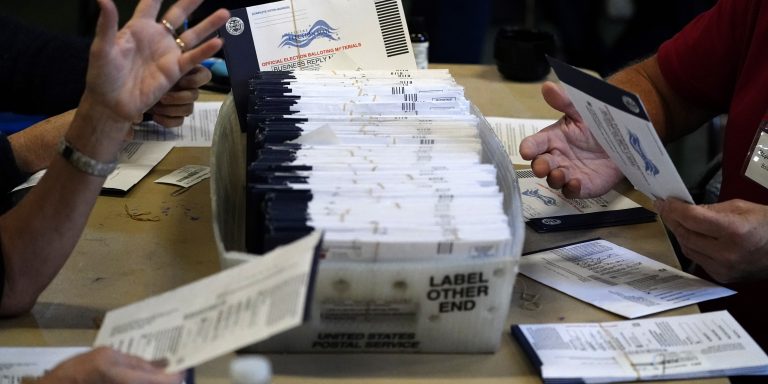INTELBRIEF
November 5, 2020
IntelBrief: As Election Results Remain Uncertain, the U.S. is a Nation Deeply Divided

Bottom Line Up Front
- As of Wednesday night, Joseph R. Biden, Jr. was the frontrunner to win the 2020 U.S. Presidential Election with more votes still to be counted.
- Trump claims he will contest the election results and the coming weeks could be as volatile as any the United States has experienced in decades.
- In an election where foreign interference was less of an issue than many anticipated, President Trump did the work of U.S. adversaries with baseless accusations of fraud and vote-rigging.
- The chaos resulting from the election has generated confusion and resentment among U.S. allies, partners, and friendly nations.
Late Wednesday evening, Joseph R. Biden, Jr. held the lead the 2020 U.S. Presidential Election, in his quest to defeat incumbent President Donald Trump. But as Biden’s supporters monitor the remaining vote counts anxiously, the entire election campaign season and the confusion surrounding the election itself reveals a country that is intensely polarized. The range of emotions—from anger to bewilderment—experienced by so many Americans over the pernicious actions of the Trump administration as votes were still being counted, reflect the deep societal divisions in the United States. On Election night, with no clear victor yet determined, President Trump publicly declared himself the winner. Polling stations remained free from violence, although many are concerned that as the President and his supporters continue to make false allegations about voter fraud, it could instigate some of his supporters to lash out physically.
President Trump’s campaign announced yesterday that it intended to file a lawsuit against the state of Pennsylvania in an attempt to shut down ballot counting while it was still in progress. Additional lawsuits were filed in both Michigan and Georgia. The Trump campaign is also calling for a recount in the state of Wisconsin, where Trump lost by as many as 20,000 votes. Yesterday afternoon, with as many as 1 million votes still left to be counted in the state of Pennsylvania, both Eric Trump (one of the President’s sons) and White House Press Secretary Kayleigh McEnany, declared premature victory for Trump in the state. Twitter labeled the tweets with a warning that ‘Official sources may not have called the race when this was tweeted.’ In the months leading up to the election, President Trump has been adamant in saying he will contest any election where he is not declared the winner and the coming weeks and months could be as chaotic as any the United States has experienced in generations. The rest of the world is watching as President Trump continues to intentionally spread disinformation accusing Democrats of cheating in the election.
The scale of the chaos radiating out from the White House is unprecedented in several important ways. At every turn, President Trump demeaned the work of various departments and agencies within the U.S. government even while ostensibly leading it. From civil servants to the intelligence community, President Trump has repeatedly questioned the loyalties of those who refuse to become sycophant. His administration has relentlessly politicized intelligence, and in the process has endangered U.S. national security. Allegations of a so-called ‘Deep State’ have contributed to the rise of dangerous conspiracies like QAnon. Even as the Republican Party was trying to encourage mail-in voting as a way to ensure a growing turnout in a time of COVID-19 restrictions, President Trump, and then his surrogates, repeatedly and explicitly denounced mail-in voting as a fraud and a ‘hoax.’ More than 90 million people voted before the official election ‘day’ on November 3rd, in a mix of advance in-person and mail-in voting. In an election where foreign interference turned out not to be the major issue many anticipated it to be, President Trump did the work of U.S. adversaries like China, Iran, and Russia by sullying the legitimacy of American democracy and needlessly denigrating and undermining American political institutions with baseless accusations of fraud and vote-rigging.
The chaos resulting from the election has generated confusion and resentment among U.S. allies, partners, and friendly nations. Accordingly, many countries are left wondering what role the United States will continue to play in the world, especially as the Trump administration primarily pursued a unilateral approach to international relations that often alienated allies and emboldened adversaries. A Biden presidency would immediately restore American credibility in the eyes of many traditional U.S. allies, from the United Kingdom to South Korea. But even if our allies abroad are assuaged by a return to more traditional American diplomacy after four years of adhocracy, it remains clear that the United States itself is a country deeply divided across multiple dimensions—racial, political, and socio-economic, to name a few. It will be difficult to heal the nation, but Biden has already sought to do so, remarking yesterday that, ‘Once this election is finalized and behind us, it’ll be time for us to do what we’ve always done as Americans: to put the harsh rhetoric of the campaign behind us...to unite, to heal, to come together as a nation.’